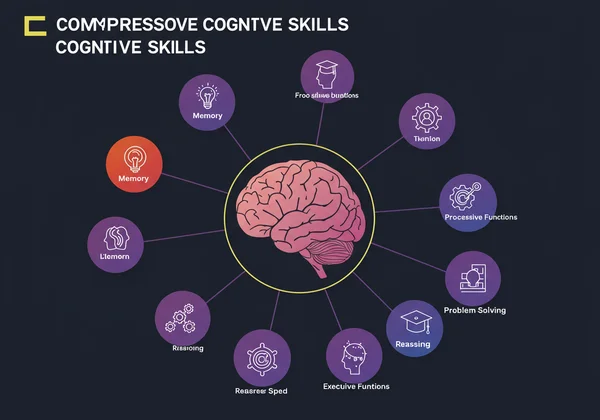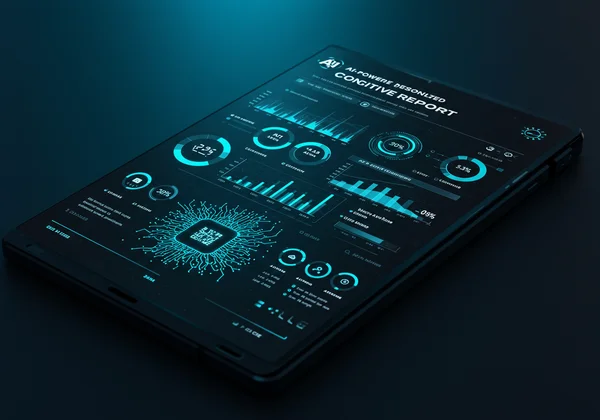Free Online Cognitive Tests: Your 7-Point Evaluation Guide
October 11, 2025 | By Audrey Fletcher
Navigating the vast landscape of online cognitive tests can be overwhelming. With countless options promising quick insights into your brain health, how do you discern a reliable, scientifically-backed assessment from a mere "brain game"? Choosing the right tool is crucial for getting accurate and meaningful insights. This guide offers a vital 7-point checklist, empowering you to confidently evaluate any free online cognitive test. This way, you can trust the insights you receive are valuable and accurate. To get a head start, why not experience a quality test yourself?
Scientific Validation: Is Your Test Backed by Research?
The single most important factor separating a legitimate cognitive assessment test from a simple quiz is scientific validation. A trustworthy test isn't just a collection of puzzles; it's a carefully constructed instrument designed to measure specific cognitive functions accurately and consistently.
Understanding Psychometrics: Validity & Reliability in Cognitive Assessment
In the world of psychological testing, two terms are paramount: validity and reliability. Validity ensures that a test measures what it claims to measure (e.g., memory, not just attention). Reliability means the test produces consistent results over time. A quality online test should be built on these psychometric principles, ensuring the feedback you get is stable and meaningful.
What to Look For: References to Established Assessments & Expert Input
Look for transparency. Does the platform mention the scientific principles or established assessments that inspired its design, such as the Woodcock-Johnson Tests of Cognitive Abilities (WJ-IV COG)? A credible tool will be open about its scientific foundations and the expertise of the team behind it. This transparency is a key indicator of a test's commitment to scientific rigor.

Comprehensive Assessment: More Than Just Simple Brain Games?
While a fun memory game can be engaging, a true cognitive testing tool provides a holistic view of your brain's performance. Cognition is a complex network of skills, and evaluating just one or two areas provides an incomplete picture.
Evaluating the Breadth: Assessing a Wide Range of Cognitive Skills
A superior test will evaluate a broad spectrum of cognitive domains. Instead of focusing solely on memory, it should cover areas like attention, processing speed, reasoning, and executive functions. For example, some of the most comprehensive platforms assess over 20 distinct cognitive skills, giving you a detailed and nuanced cognitive profile.
Beyond Memory: Why Diverse Domains Like Attention and Executive Function Matter
Difficulties in daily life, such as trouble multitasking or planning, often stem from executive functions or attention, not just memory. A test that covers these diverse areas can provide much deeper insights into your cognitive strengths and weaknesses, helping you understand the "why" behind your everyday experiences.

Personalized Insights: Does It Offer Actionable, AI-Enhanced Reports?
Getting a score is one thing; understanding what it means for you is another. The best online tests go beyond raw data to provide personalized, easy-to-understand reports that connect your performance to real-world implications.
Understanding Your Unique Cognitive Profile with AI-Powered Analysis
Modern platforms are leveraging AI-powered analysis to offer deeper insights. By optionally and anonymously considering factors like age and education, AI can provide a more contextualized report. This helps you understand your performance relative to your peers and highlights your unique cognitive patterns.
Translating Data to Daily Life: Actionable Advice for Cognitive Health
A truly valuable report doesn't just tell you how you did—it offers actionable advice. It should explain your cognitive strengths, identify areas for improvement, and suggest evidence-based strategies to support your overall cognitive health. This empowers you to take proactive steps. If you are ready for these insights, you can start your assessment now.

Data Privacy & Security: Protecting Your Sensitive Health Information
When you take an online cognitive test, you are sharing personal data. Ensuring that information is handled securely and ethically is non-negotiable.
Anonymity, Confidentiality, and Secure Data Handling Protocols
A trustworthy platform will prioritize your privacy. Look for a clear privacy policy that explains how your data is collected, anonymized, and stored. Secure data handling and a commitment to confidentiality are hallmarks of a professional service that respects its users.
Avoiding Marketing Overload: Focus on Your Health, Not Data Exploitation
Be wary of platforms that seem more interested in gathering your data for marketing than providing you with health insights. A legitimate health tool should be focused on its core mission: delivering a high-quality cognitive assessment. Your focus should be on your health, not on navigating ads or unsubscribing from mailing lists.

Usability & Accessibility: Is the Online Test User-Friendly for All?
A powerful test is useless if it's too complicated to take. A well-designed platform ensures that anyone, regardless of their technical proficiency, can complete the assessment smoothly.
Intuitive Design for Diverse Users, from Tech-Savvy to First-Timers
The best tools feature a clean, intuitive interface that guides you through each step. Instructions should be clear and simple, making the experience stress-free for everyone, from a tech-savvy young adult to an older individual trying an online cognitive test for the first time. The goal is to test your cognition, not your computer skills.
Multilingual Support: Breaking Down Language Barriers for Global Access
In our interconnected world, accessibility means offering services in multiple languages. A platform that provides its assessment in numerous languages demonstrates a commitment to helping people globally understand their cognitive health, breaking down cultural and linguistic barriers.
Credibility & Professional Trust: Who is Behind the Assessment?
The credibility of a cognitive test is directly tied to the expertise of its creators. Always investigate who is behind the tool you are considering using.
The Expert Team: Neuropsychologists, Data Scientists, and Educators
Look for an "About Us" page that details the qualifications of the development team. A robust test is typically the product of a collaboration between neuropsychologists, data scientists, and educational experts who combine scientific knowledge with technological prowess. This expert team is your assurance of quality.
Trusted by Professionals: Clinical, Research, and Educational Applications
One of the strongest endorsements is when a tool is used by professionals in clinical, research, or educational settings. If researchers and clinicians trust a platform for their data collection, it's a powerful signal that it is reliable, accurate, and built to high standards.
Clear Disclaimers & Limitations: Setting Realistic Expectations
Finally, a trustworthy platform is transparent about what it can and cannot do. Honesty about a tool's limitations is a sign of integrity and a commitment to responsible practices.
Screening vs. Diagnosis: Understanding What an Online Test Can and Cannot Do
It is critical to understand that an online screening tool is not a substitute for a clinical diagnosis. A high-quality test can identify potential areas of concern and provide valuable information, but it cannot diagnose conditions like dementia or MCI. A reputable site will state this clearly.
When to Consult a Healthcare Professional: The Importance of Clinical Guidance
A responsible platform will always encourage users to discuss their results with a doctor or a qualified healthcare professional. The test should be positioned as a tool to facilitate a more informed conversation with a medical expert, not to replace it.
Taking Control: Your Next Steps for Accurate Cognitive Insights
Choosing a free online cognitive test doesn't have to be a gamble. By using this 7-point guide, you can confidently evaluate your options and select a tool that is scientifically sound, comprehensive, secure, and user-friendly. A reliable assessment provides more than just a score; it offers a window into your brain health, empowering you with the knowledge to take proactive steps.
Ready to experience a test that checks all seven boxes? Try our cognitive test and discover the actionable, personalized insights you deserve.
Frequently Asked Questions About Online Cognitive Tests
Can I take a cognitive test online for free?
Yes, many platforms offer a free cognitive test. However, as this guide highlights, it's crucial to evaluate their quality. A good free test, like the one offered on our platform, will be scientifically validated and provide a comprehensive report without hidden costs.
What does a cognitive test consist of?
A comprehensive cognitive ability test consists of a series of tasks designed to measure different brain functions. These can include challenges related to memory, attention, reasoning, processing speed, and problem-solving. The goal is to create a holistic profile of your cognitive abilities.
How is this different from free brain games?
While brain games can be entertaining, they are not standardized or validated to measure cognitive function accurately. A scientific cognitive assessment test is built on psychometric principles to ensure results are reliable and valid, providing a meaningful baseline of your cognitive health rather than just tracking game performance.
What is a good cognitive test score?
A "good" score is relative and depends on factors like age and education. Advanced platforms use AI to provide personalized feedback that compares your performance to a relevant demographic group. The focus should be less on a single score and more on understanding your unique profile of cognitive strengths and weaknesses.
What if you fail a cognitive test?
First, these tests are not pass/fail. They are screening tools that measure performance across a spectrum. If your results indicate potential areas of concern, it is not a diagnosis. It is a sign that you should share the results with a healthcare professional for further evaluation and guidance. It's a starting point for a conversation about your brain health.